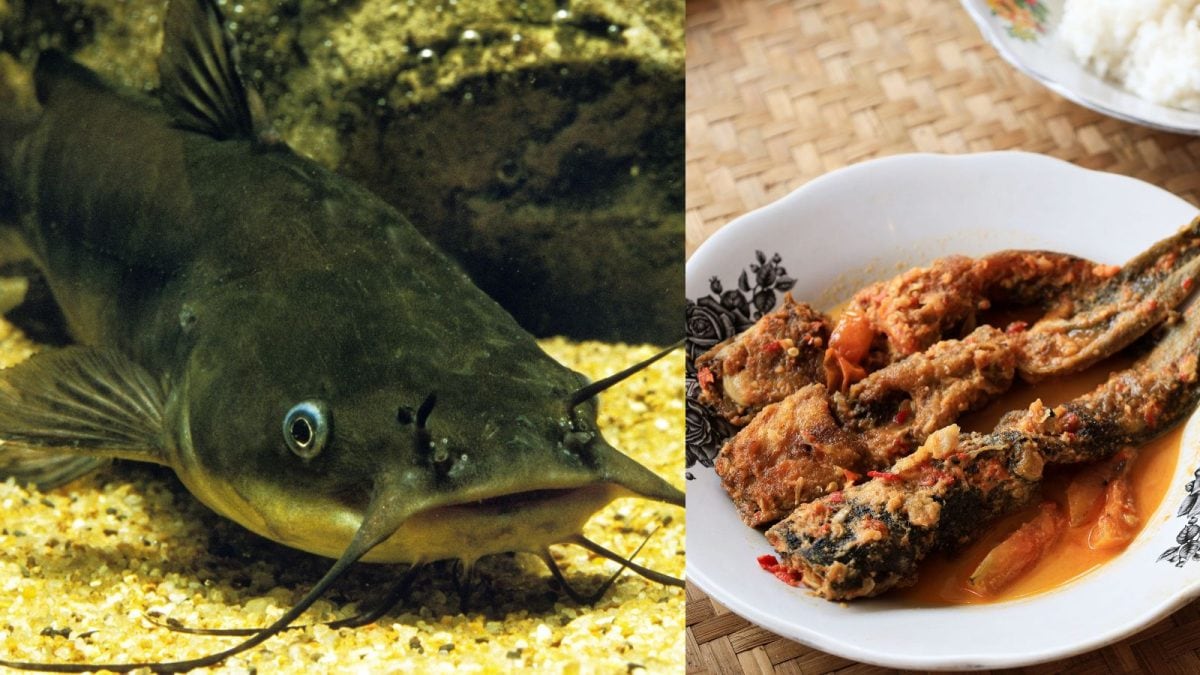Last Updated:
Despite the ban, Mugudu slips through nets. For many, Mugudu is less a forbidden catch and more a part of cultural identity, tied to taste and tradition that refuse to fade.

This fish is officially banned. But the enticing taste makes it favorite and available in local markets. (Image: X)
In the bustling markets of Karnataka’s coastal and Malnad regions, one fish commands attention like no other: the Mugudu, or Murugodu, known internationally as Catfish. For decades, this slippery freshwater catch has been a prized delicacy, cherished by locals who buy it regardless of price whenever they spot it. Yet, hidden behind its popularity is a story that winds between culinary love, ecological threat, and a government ban that hasn’t fully stopped the trade.
A Fish That Lives in Mud
Recommended Stories
What sets the Mugudu fish apart is not just its taste but its almost mythical survival skills. Unlike most fish that wither when water disappears, the Mugudu can endure in nothing but mud after streams and ponds dry up post-monsoon.
This ability sparks endless fascination: how does a fish breathe in mud without water? The secret lies in its capacity to absorb oxygen from the air, allowing it to survive where other species would perish.
Slippery Body, Elusive Catch
Predators such as herons, storks, and crows often dig in muddy pools to prey on these fish. But catching a Mugudu is no easy feat. Its jelly-like, slippery skin makes it almost impossible to grip. Humans face the same challenge; bare hands simply slide off the fish’s surface.
For this reason, traditional hand-catching rarely works. Instead, fishermen rely on nets to secure them. Their habitats are typically the muddy backwaters and freshwater pools that form after rains, where they feed by filtering nutrients directly from the mud.
The demand for Mugudu is so strong that its price is consistently high. In Karnataka’s coastal towns, a kilogram sells for around Rs 200, and some individual fish weigh anywhere between two and ten kilograms.
For families in the region, preparing Mugudu curry or fry is a treat steeped in tradition. The fish is considered both filling and flavorful, which explains why buyers overlook the expense.
A Ban That Few Obey
But here’s the twist: despite the thriving trade, Mugudu has been officially banned in India since 2000. The Fisheries Department prohibited its consumption and sale after studies revealed its destructive impact on aquatic ecosystems.
As a carnivorous species, Catfish feed on other smaller fish, amphibians, and aquatic life. In lakes and rivers where they thrive, they often drive native species to the edge of extinction. Their ability to survive in mud means they dominate ecosystems in ways other fish cannot.
The ban is not just about protecting biodiversity; it is also about safeguarding human health. Catfish have been found to contain high levels of toxic elements that can harm the body, particularly the heart.
Farming practices have also raised alarms. In many cases, Catfish are fed with poultry waste and discarded meat, contaminating both the fish and the environment. Consumption of such fish can have long-term health consequences, making them far riskier than their popularity suggests.
The Reality of Illegal Sales
Despite the ban, Mugudu continues to slip through enforcement nets. Reports of raids on illegal ponds and the seizure of trucks transporting Catfish are common. Yet, in markets across Karnataka, the fish remains available, often sold quietly but openly to eager buyers.
Fishermen argue that demand is too strong, and enforcement too weak, for the ban to succeed fully. For many, Mugudu is less a forbidden catch and more a part of cultural identity, tied to taste and tradition that refuse to fade.
The story of Mugudu fish captures the contradictions of human appetite. On one hand, it is a cultural delicacy, a taste of the coast and hills that brings communities together over a shared meal. On the other, it is an ecological invader and a health hazard.
For now, its fate lies in a grey zone – officially banned, but unofficially thriving. For the people who crave it, Mugudu is more than a fish; it is nostalgia, flavor, and defiance served on a plate, slippery as ever.
About the Author
The News Desk is a team of passionate editors and writers who break and analyse the most important events unfolding in India and abroad. From live updates to exclusive reports to in-depth explainers, the Desk d…Read More
The News Desk is a team of passionate editors and writers who break and analyse the most important events unfolding in India and abroad. From live updates to exclusive reports to in-depth explainers, the Desk d… Read More
October 02, 2025, 10:55 IST
Loading comments…
Stay Ahead, Read Faster
Scan the QR code to download the News18 app and enjoy a seamless news experience anytime, anywhere.

login



